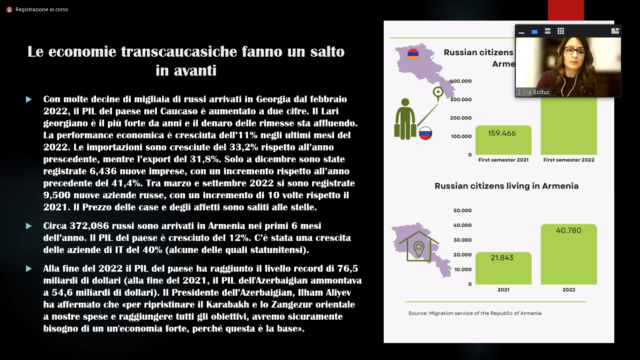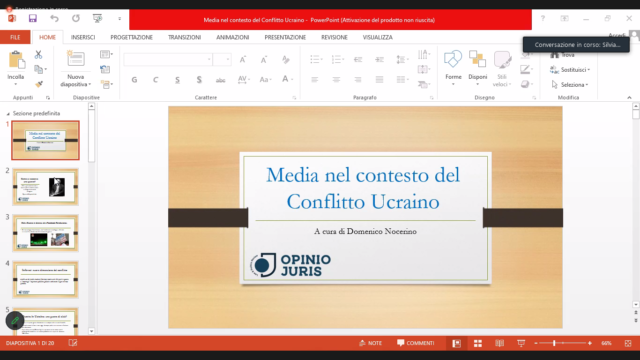Summary: online webinar “A year of Ukraine conflict: insights, geopolitical analysis, possible future developments.”

On Tuesday, February 21st, 2023, SpecialEurasia, Mondo Internazionale, Opinio Juris – Law & Political Review and MInter Group srl organised the online webinar “A year of Ukraine conflict: insights, geopolitical analysis, possible future developments” to analyse the last year of fighting in Ukraine contextualising this event in the Eurasian geopolitical chessboard.
Geopolitical scenario
Tracing the roots of the Ukraine conflict, we cannot forget that at the end of December 2021 and the beginning of January 2022, international media agencies, citing the US State Department and Intelligence agencies, reported that the Kremlin was preparing a military invasion of Ukraine. Although this information circulated the mainstream for weeks, many experts found it hard to believe Europe could again experience a conflict on its territory.
On February 22nd, 2022, Russian President Vladimir Putin signed the presidential decree recognising the Donetsk and Lugansk republics. Although alarmed, public opinion still hoped that the path of diplomacy could avert conflict.
Only two days later, on February 24th, 2022, the Russian armed forces invaded the Ukrainian territory and began what the Kremlin has always referred to as Special’naja Voennaja Operacija (special military operation), even though the international community, mainly the West, described this event as a military invasion of sovereign territory.
Online webinar on the Ukraine conflict: a summary
Today, after a year of conflict in Ukraine and the media narrative, the Ukrainian territory appears devastated and desolate, while the diplomatic dialogue seems far or impossible. Beyond the millions of articles that the media have published, SpecialEurasia, in partnership with Mondo Internazionale, Opinio Juris – Law & Politics Review, and Minter Group srl, organised an online webinar to investigate and understand the current military status of the conflict, geopolitical implications for Europe, the blizhnee zarubezhe (the post-Soviet space that Moscow defined as the ‘near abroad’ and part of its lebensraum, ‘vital space’), and the Eurasian microregion, and to assess the geopolitical risk coming from the Ukraine conflict.
On February 21st, 2023, Giuliano Bifolchi, SpecialEurasia Research Manager, moderated an online webinar attended by the speakers Silvia Boltuc, SpecialEurasia Managing Director, the Italian army General Francesco Ippoliti, Michele Pavan, President of Mondo Internazionale APS and Intelligence & Geopolitical Advisor, Domenico Nocerino, Founder and director of Opinio Juris – Law and Politics Review (ISSN 2531-6931), and Saverio Lesti, Head Researcher International GEO of Mondo Internazionale.
During the webinar, the speakers highlighted that due to the many diplomatic mistakes and miscalculations, it was impossible to avoid the Ukraine conflict, which today appears far from the peace dialogue or its end. Indeed, the Ukraine conflict found its roots in the past, at least in 2014, when after the Euromaidan, in Crimea, a referendum allowed Russia to annex this region while in Donetsk and Lugansk local people labelled as ‘pro-Russian separatists’ claimed their independence from Kyiv and started fighting against the Ukrainian armed forces.
The Ukraine conflict impacted the post-Soviet space, especially the Caucasus and Central Asia, and the entire international arena, exacerbating local problems. For instance, in September 2022, Azerbaijani military aggression against Armenia stressed how delicate the situation is in the South Caucasus. This region plays a strategic role in EU Energy Security Policy. In Georgia, Tbilisi Government faced Kyiv’s request to open a “second military front” against Russia and local manifestation in support of Ukraine. However, the Russian-Georgian trade turnover is essential to the Georgian economy. Therefore, while the local population organised demonstrations supporting Ukraine, the Georgian Government confirmed its strategy not to impose sanctions against Russia.


Talking about the military aspect of the conflict, the speakers underlined that the Russian strategy in Ukraine might be divided into three phases. Both sides report high casualties and an even higher number of wounded. Undoubtedly, the Ukraine conflict, as also happened in the 2020 Nagorno-Karabakh Conflict, marked the strategic importance of the Unmanned Aerial Vehicle (UAV). Therefore, we might forecast a rapid expansion of this military-industrial sector since UAVs demonstrated their efficacy in a combat zone.
Looking at the geopolitical risk, since European countries are financially and militarily supporting Ukraine, it is advisable to assess how long the European Union will be able to supply weapons and money without running into internal problems. On the other side, the Russian Federation has also faced internal economic issues due to Western sanctions, which pushed the Kremlin to find alternative markets.
The webinar stressed that jihadist and terrorist organisations widely attempted to exploit the Ukraine conflict by inviting their militants to go to Ukraine for advanced military training, Western weapons, and guerilla experience. Considering that in January 2023 several media agencies reported that the terrorist group Ajnad al-Kavkaz, operating in Syria, arrived in Ukraine to support the Chechen battalion Shaykh Mansur, there is a substantial risk that the conflict might attract more jihadist groups, which see the Ukrainian territory as a ‘bridge’ to reach and hit Europe.
